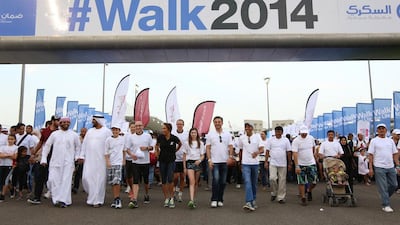Every parent wants their children to be healthy and energetic, but how many of them actually make an effort to create a healthy environment for their families?
In the UAE, as in other parts of the world, Type 2 diabetes, which is normally associated with obese adults, has been increasingly diagnosed in children. Local doctors have described this as a "national health emergency" and called for more efforts to tackle the disease.
Dr Baha’a Sha’ath, a consultant nephrologist at Healthpoint, told The National that up to 150 new cases of diabetes are reported each day in the UAE, some of them in children as young as six.
These statistics alone should serve as a wake-up call for all parents. And doctors say that what is more alarming than having 18.7 per cent of the UAE population diabetic is the large number of diabetics who are undiagnosed or have a pre-diabetic glucose intolerance and are very likely to get the disease in the near future.
Unfortunately, it’s harder to detect Type 2 diabetes in children than in adults. The disease can go undiagnosed for a long time because it can have no apparent specific symptoms. Blood tests are the primary way of making a clear diagnosis.
The international standard age for screening for diabetes is 45. But doctors say that is no longer applicable because of the rapidly increasing number of younger people worldwide suffering from the disease. They recommend that children as young as 10 be screened.
What is really concerning is that if the disease is not detected early and properly managed, the high levels of glucose in the blood can lead to serious health complications in the long run. It can cause heart disease, kidney disease, nerve damage, or even blindness and impotence.
The good news is that unlike Type 1 diabetes, Type 2 can be prevented. Excessive weight gain, obesity and a sedentary lifestyle are factors that put a person at risk for this type of diabetes. Based on International Diabetes Federation estimates, more than 70 per cent of cases can be avoided or delayed by adopting healthier lifestyles.
But how many parents would be willing to get their children screened? More importantly, how many of them would take the issue seriously enough to change their children’s unhealthy lifestyle before they become prone to the disease?
In almost every family that I know, there is at least one member who suffers from diabetes. It is even more normal to have several overweight or obese members to the extent that many families do not even see it as a health issue.
I come across many parents who feed their children an alarming amount of processed sugar and fats on a regular, even daily, basis. It’s a tradition everywhere to reward children when they do good by giving them chocolate or crisps – without thinking of the unhealthy consequences.
Children eat all sorts of sweets and other kinds of junk food on special occasions, such as birthday parties. They also consume lots of sugar-filled fizzy drinks and artificially flavoured juices that have also potentially harmful effects on their health.
In a study conducted by YouGov for Al Aan TV's Nabd Al Arab (Arabs' Pulse) programme and The National, half of the parents surveyed admitted that they regularly give their young children unhealthy food despite being aware of the adverse effects those foods could have. Why? Because the children insisted.
Unfortunately, it’s more convenient to to feed children fast food, to cave in to their demands for crisps or to give them a sweet when they cry to calm them down. And so these children grow up accustomed to this kind of food and it becomes more difficult for them to give it up as adults.
Another important factor is the limited amount of physical activities that modern children engage in. Parents don’t only cave in to their children’s fast-food requests, but also to their demands to spend long hours watching television, playing video games or using electronic gadgets.
Too few parents encourage their children to participate in a sport, to take the stairs instead of using the lift, or to play outside the house with their friends.
It requires more commitment on the part of parents to say no to children when they demand junk food and instead feed them a nutrient-rich meal that will help them to grow healthier. It also requires more commitment to increase the physical activities that children engage in.
The issue requires more than just awareness, it needs action.
aalmazrouei@thenational.ae
@AyeshaAlmazroui

